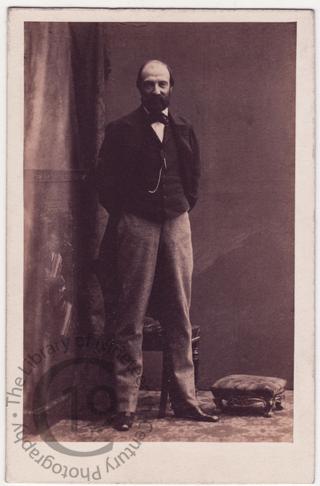
François d’Orléans, Prince de Joinville
A carte-de-visite portrait of François d’Orléans, Prince de Joinville (1818-1900), the third son of Louis Philippe, duc d’Orléans, afterwards King of the French.
Born at the Château de Neuilly, he was educated for the Navy and became a lieutenant in 1836, His first conspicuous service was at the bombardment of San Juan de Ulloa in November 1838 and at Veracruz, he took the Mexican general Arista prisoner with his own hand. He was promoted to captain and in 1840 was responsible for the remains of Napoléon on their journey from Saint Helena to France. In 1844 he conducted naval operations on the coast of Morocco, bombarding Tangier and occupying Mogador, and was rewarded with the rank of vice-admiral. In the following year he published in the Revue des deux mondes an article on the deficiencies of the French Navy which attracted much attention. By his hostility to the Guizot ministry, as well as by an affectation of ill-will towards Great Britain, he gained considerable popularity.
However, the Revolution of 1848 swept him away along with the other Orléans princes, and he took refuge in England, at Claremont in Surrey. At the outbreak of the American Civil War in 1861, he travelled to Washington and placed his services, as well as those of his son and his two nephews, at the disposal of the United States government. When difficulties arose between France and the United States with regard to the affairs of Mexico, the Orléans princes withdrew from the American army and returned to England. At the overthrow of the Second Empire in 1870 he tried to re-enter France but was immediately expelled. Returning under the assumed name of 'Colonel Lutherod', he joined the army of General d’Aurelle de Paladines, under whom he fought bravely, but was nevertheless returned once more to England when he afterwards divulged his identity and sought formal permission to serve.
In the National Assembly elected in February 1871, he was elected to sit for the Haute-Marne, but under an arrangement with Thiers, did not take his seat under the latter had been chosen as president by the provisional government. Joinville’s deafness prevented him from making any figure in the Assembly, and he resigned his seat in 1876. In 1886 the provisions against any pretenders to the throne deprived him of his rank in the Navy, but he continued to live in France, dying in Paris on 16 June 1900.
He had married on 1 May 1843, in Rio de Janeiro, Princess Francisca de Bragança, sister of Pedro II of Brazil. He had a son, the duc de Penthièvre, also brought up in the Navy, and a daughter, Françoise, who married the duc de Chartres in 1863.
Photographed by Camille Silvy of London in 1860.
Code: 124974




